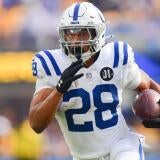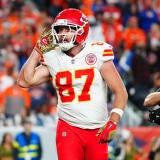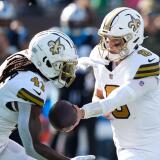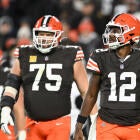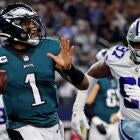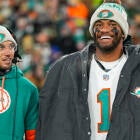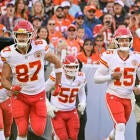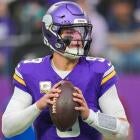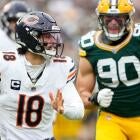
Cowboys coping with aftermath of Marshawn Kneeland's tragic death, will lean on Dak Prescott for guidance
Prescott: 'There wasn't a time that Marshawn wasn't talking, wasn't open or putting smiles on people's faces'
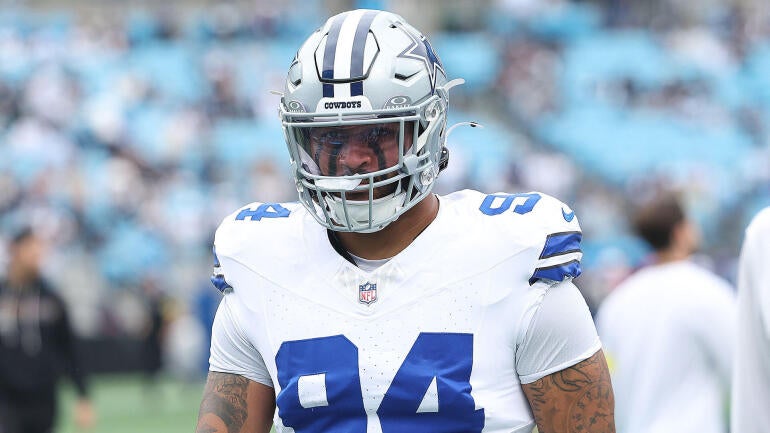
FRISCO, Texas -- The Dallas Cowboys returned to their regular meetings and practice schedule on Thursday following 24-year-old edge rusher Marshawn Kneeland's Nov. 6 death by a self-inflicted gunshot, still processing the sudden reality that he's no longer here.
Cowboys defensive tackle Osa Odighizuwa, one of two Dallas players who spoke at the Tuesday night candlelight vigil for Kneeland along with defensive tackle Solomon Thomas, is trying to come to grips that Kneeland is gone.
"It's just crazy. It's still something that I'm trying to wrap my head around. I was at my locker before practice, and I looked up and I felt like I saw him, and 'Ah nah, that's someone else.' It hits you, you know what I mean?" Odighizuwa said on Thursday. "Just moments like that. It's still sinking in, to be honest. It still doesn't feel all the way real."
Dallas wide receiver Ryan Flournoy, a 2024 sixth-round pick who entered the NFL with Kneeland as the second-round pick of their draft class, was shocked when he found out. The draft classmates became tight since Flournoy and his wife Kalei went on double dates with Kneeland and his girlfriend Catalina Mancera.
"It was shocking, honestly. The bye week everybody [at] home just waking up and hearing that news is shocking, honestly. A lot of y'all know me and Marshawn came in together as rookies. So my wife and his girl became close. We went on double dates," Flournoy said on Thursday. "I'm just thinking 'man, [all the] times we went on double dates, I just wish I would have told him you got to wait on God no matter how hard life gets. Just turn to God because I'm a witness.' I've read it in the Bible, and I've witnessed it in [my] life. May he rest in peace. All I could do is just pray for him for sure."
When dealing with suicide, those close to the person who is now gone can sometimes spend plenty of time racking their brains about if they missed any signs or what could have been done differently. That thought process, no matter how unfair it is to those still around, is happening in Dallas.
"Of course. Those questions are natural. You try not to think about them but when you're having very open and authentic conversations with these guys, the pain is real. The questions are real," Cowboys coach Brian Schottenheimer said. "But again the more you talk to the experts, the people that deal with this all the time, they say a lot of times you're never going to know. So but I'd be lying if I said to you I don't wake up in the middle of the night or when I'm on the phone talking to one of those guys [Cowboys players], and have those thoughts. You do."
For all the time Flournoy spent with Kneeland, he never saw any warning signs.
"No signs at all. Just a happy guy, just always smiling, always cracking jokes, dancing, playing a lot," Flournoy said. "You would never know it, and that's why it's crazy, shocking."
Odighizuwa said he's seen Kneeland get frustrated, as everyone does, but nothing that could have indicated he would be speaking about Kneeland's death.
"I've seen him get upset before, and that's why I know, Marshawn was a sensitive guy," Odighizuwa said. "I know everything was 110% with him, even his emotions. When he got upset, he would be very upset. That was kind of the most that I knew."
Thomas also didn't see any signs, but he's well aware that doesn't mean someone isn't struggling with their mental health. Thomas lost his sister, Ella, to suicide at the age of 24, the same age Kneeland was, back in 2018.
"Marshawn was in the building, smiling everyday. He was happy he was listening to music. He was dancing all the time, but that's the thing with mental health and suicide. You just never know what someone's going through, someone could be smiling, someone could be dancing, laughing, having a great time expressing all this joy, but inside, they could really be fighting the battle that you never know about. You don't know what the chemicals are telling them in their brain. You don't know the trauma from their childhood," Thomas said on Thursday.
"You don't know everything they've been going through, and that's why it's so important to be kind. It's so important to ask people how they're doing. It's so important to tell people the resources around them that therapy is okay, as a man, therapy is okay, as a woman like, these are these things that we are that we need to go through because you never know what battle someone's going through. It's just, it's hard, it's tragic. Such a young life that should be here. ... If you look at the mental health statistics, they start at the age of nine, like kids are dying by nine to suicide, like it's something our whole nation needs to take seriously. .... It's such a preventable death, and we just need as a nation to come together. Be kind. Put more funding into mental health resources. Help people get to therapy and let people know it's okay to cry. Let people know it's okay to not always put a smile on and be good."
Dallas quarterback Dak Prescott, like Thomas, is unfortunately familiar with suicide too since he lost his brother Jace to it in 2020. He also never saw signs that Kneeland was struggling, which is why he is emphasizing that everyone put more into knowing people beyond the surface.
"Yeah, guilt is tricky. Guilt is one of those things that when those thoughts come in, that's where you first have to counteract and counter thoughts. To go off of what Solomon said, 'yeah, there were no signs.' Respect to the family, they don't want to go down and tag this as mental health. With that being said, yeah there were no signs," Prescott said Thursday. "I crossed him a lot, passed him a lot through the hot tub, through the cold tub, through the training room and far opposite of any signs. There was never really isolation. There wasn't a time that Marshawn wasn't talking, wasn't open or putting smiles on people's faces. So it's tough to even talk to these two things hand in hand. For me, it's a moment of a cup run over. That's why it's important for us to connect, just communicate, talk, vent and just try to get things off our plates as much as we can and just be there even when you feel like you're not. Your presence matters."
Guilt and grief can sometimes turn to anger, which is an emotion Prescott finds himself dealing with in times like these. That's when he leans on the training he and his teammates have received from team psychologist Dr. Heather Twedel and other mental health professionals the Cowboys brought in to speak with players over the last week. His key takeaways from those sessions are to be vulnerable and let everything out in order to actually process and work through whatever emotions are bubbling up inside.
"Obviously me and Solly have been through this, but I'll be the first to say, I may be the champion of speaking up but I'm not necessarily the champion of dealing with grief, I guess you can say. I can say I'm a champion of moving forward and past it and using it as your source of strength," Prescott said. ... "I get angry a lot. The best way is when I get angry or I get sad in those moments, I think about 'how can I counteract that?' Usually, it's 'how can I make somebody smile or how can I do something better?' So just little things like that have been helpful. I know they've been helpful to me. ... I've taken a lot from those conversations from O2X, from Doctor T [team psychologist Dr. Heather Twedel], from the professionals and have brought them into smaller conversations as we've had breakouts or just hot tub talk or conversations at lunch. It's just the more we can talk, the more we can connect, that's the only good in this honestly at this moment. Reminds us how important it is to not just know these jersey numbers, but to know the family and to know things beyond this building."



